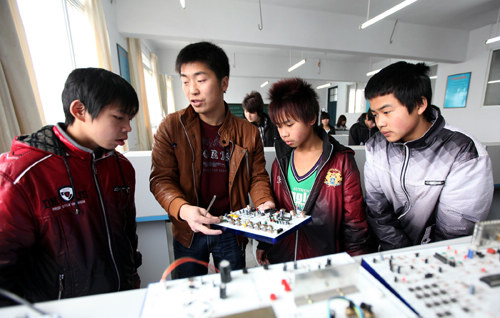|
 |
|
LEARNING SKILLS: Rural students attend a training session at a vocational school in Guang'an, southwest China's Sichuan Province, on March 14 (QIU HAIYING) |
According to a detailed assessment report published by China's State Council Information Office (SCIO), all the measures outlined in the National Human Rights Action Plan of China (2009-10) had been successfully put into place by the end of 2010.
The report published on July 14 paid specific attention to the implementation of policies safeguarding citizen's economic, civil, political, social and cultural rights, and human rights in other spheres.
In April 2009, the SCIO published the action plan. This was China's first national plan on human rights.
"With the compilation and implementation of the action plan, citizens' awareness of human rights has increased," said Wang Chen, Minister of the SCIO.
"The fulfillment of all the targets and tasks in the action plan as scheduled shows that the cause of human rights in China has entered a new stage," he said.
Better lives
Between 2009 and 2010 China faced a difficult economic situation. The global financial crisis imposed a heavy toll on China's economic and social development, and posed severe challenges to people's livelihoods and human rights, the SCIO report said.
Facing these difficulties the Chinese Government adopted a series of countermeasures, including a 4-trillion-yuan ($586 billion) economic stimulus package, to push forward programs related to people's livelihoods and infrastructure development. As a result, China was the world's first major economy to emerge from the global financial crisis and substantially improve its people's livelihoods.
In 2009 and 2010, China's GDP increased by 9.2 percent and 10.3 percent, urban residents' disposable income rose by 9.8 percent and 7.8 percent, and rural residents' net income went up by 8.5 percent and 10.9 percent, respectively.
To create employment opportunities for working-age people and protect the legitimate rights and interests of laborers throughout the country, the action plan prompted the government to implement the Employment Promotion Law.
According to the SCIO report, 22.7 million new jobs were created in urban areas, 26.1 percent higher than the target set by the action plan, and 19.39 million farmers found jobs in cities, 7.7 percent higher than the target set by the action plan. Urban registered unemployment rates remained steady at 4.1 percent, 0.9 percentage points lower than the plan's 5 percent ceiling.
Meanwhile, the report said living and working conditions in China's rural areas improved significantly.
At the end of 2010, the number of people living below the poverty line at 1,196 yuan ($186.41) of annual income decreased to 26.88 million, 13.19 million fewer than at the end of 2008. The number of people covered by the urban basic old-age insurance reached 257 million, 38 million more than at the end of 2008. As of 2010, the basic medical insurance for urban residents covered 430 million people, while the new rural cooperative medical insurance covered 836 million people. The total number of insurance participants reached 1.26 billion, or over 90 percent of the country's population.
Figures from the SCIO report indicated the right to education had been fully guaranteed. In 2010, the state exempted 130 million rural students from paying tuition and other fees, and subsidized about 12.24 million boarders from poor rural families. At the end of 2010, 100 percent of the school age population had access to the nine-year compulsory education. Only 4 percent of the population above 15 years of age remained illiterate.
Safeguarding farmers' rights and interests was emphasized by the action plan.
Local governments have published uniform standards for land requisition and raised the compensation level by 20-30 percent and even over 100 percent in some places, the report said.
A dynamic mechanism for adjusting compensation standards has been established, under which the compensation levels for land requisition are adjusted every two or three years.
Social administration
In 2009 and 2010, China took effective measures to enhance democracy and the rule of law, actively and steadily advancing the reform of the political system, the SCIO report said.
It said a socialist legal system with Chinese characteristics has been established, covering all sectors of social life and all aspects of human rights protection.
In June 2010, the Supreme People's Court and the Supreme People's Procuratorate jointly issued a document, stipulating confessions and witness testimony obtained by illegal means such as torture should not be taken as evidence to support a court ruling.
Meanwhile, measures on forbidding illegal detentions by law enforcement personnel have been implemented in the past two years, according to the report.
| 